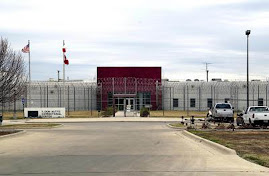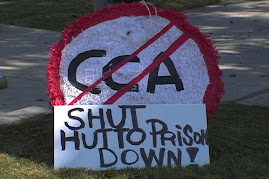ACLU Strikes Deal To Continue Humane Conditions At Hutto Detention Center
(8/7/2009; Updated 8/10/2009)
Agreement Will Remain In Place Until All Families Have Been Released
FOR IMMEDIATE RELEASE
CONTACT: (212) 549-2666; media@aclu.org
NEW YORK – The American Civil Liberties Union and Immigration and Customs Enforcement (ICE) officials today struck a deal to extend an agreement requiring ICE to maintain improvements in the conditions at the T. Don Hutto family detention center in Texas and submit to external oversight until the last family is released from the facility.
The deal comes on the heels of an announcement Thursday that the government will immediately begin ending the detention of families at Hutto, the focus of 2007 lawsuits filed by the ACLU charging that children were being illegally imprisoned under inhumane conditions. The last family is expected to be released from Hutto no later than the end of the year.
"No young child should ever have to endure imprisonment in an adult prison," said Vanita Gupta, staff attorney with the ACLU Racial Justice Program and a lead attorney in the Hutto litigation. "Now that the long-overdue decision has been made to end the detention of families at Hutto, the government is to be commended for wanting to ensure that the improvements in the facility's conditions that have been made during the past two years remain in place until there are no families left there."
The ACLU's lawsuits were filed on behalf of 26 immigrant children between the ages of one and 17 detained with their parents who, in almost all cases, were seeking asylum. A settlement agreement reached several months after the lawsuits were filed mandates, among a number of other things, that children be given expanded educational programming and increased recreation time outdoors. The agreement was set to expire August 29.
The decision to end family detention at Hutto was made as part of a broad government plan to improve the immigration detention system. According to the plan, officials will work to consolidate many detainees in facilities with conditions that reflect their status as non-criminals, establish more centralized authority over the system and create more direct oversight of detention centers.
The plan also calls for ICE to stop sending families to Hutto, and to relocate the remaining 127 detainees there. Some will be transferred to an 84-bed facility in Pennsylvania, while others will be considered for programs that do not require detention, such as home and electronic monitoring.
Attorneys involved in the Hutto litigation include Gupta of the ACLU's Racial Justice Program; Judy Rabinovitz of the ACLU's Immigrants' Rights Project; Lisa Graybill of the ACLU Foundation of Texas; and Barbara Hines of the University of Texas School of Law Immigration Clinic.
A copy of the stipulation is available online.
Additional information about the ACLU's Hutto litigation is available online at.
Showing posts with label alternatives to detention. Show all posts
Showing posts with label alternatives to detention. Show all posts
Monday, August 10, 2009
Friday, August 7, 2009
Berks County Family Center full
The Reading Eagle reports that Berks County officials were unaware of ICE's policy change, and have no room for families transferred from Texas:
Practically speaking, it seems preferable to release families on bond, parole, and recognizance and as their claims are processed through immigration courts.
Most families detained at Hutto and Berks are asylum-seeking, and are therefore eligible for various forms of release. In fact, detaining refugees and asylum-seekers in prison-like conditions is generally considered bad policy and against international law, as this can re-traumatize people fleeing persecution, abuse, violence, and torture.
Federal officials announced Thursday that they were closing a detention center for immigrant families in Texas and sending the detained families to the Berks Family Shelter Care Facility in the former Berks Heim.No word yet on whether Hutto's families will, indeed, be transferred or whether ICE will allow the detained family population to shrink gradually.
But nobody told Berks County. And the Berks facility is full.
County Commissioner Kevin S. Barnhardt, who is chairman of the county prison board, said he was unaware of the move by the Immigration and Customs Enforcement agency.
Kenneth A. Borkey Jr., executive director of the Bern Township facility, which houses families awaiting immigration hearings, said the center is at capacity.
Immigration officials could not be reached for comment.
In the announcement, they said the closing of the 512-bed T. Don Hutto Family Residential Facility in Taylor, Texas, was the first step in shifting illegal-immigration cases from the criminal to the civil court system.
Officials said they would send detained families to the Berks facility until it was filled and then develop alternative programs, such as supervised release, to monitor families awaiting deportation hearings.
Borkey said he was drafting a memo with the bad news for the immigration agency.
"We have an 84-bed capacity and we are at capacity," Borkey said.
Borkey said he planned to notify county commissioners and consult with immigration officials about reconfiguring the building to make room for more detainee families.
The county, which signed a contract with ICE that became effective Thursday, is reimbursed $197 a day per individual.
Borkey said news of the Texas closing rattled his employees, who feared their jobs also might be in jeopardy.
"At this time the county has not been informed of any changes to our program," Borkey said.
Practically speaking, it seems preferable to release families on bond, parole, and recognizance and as their claims are processed through immigration courts.
Most families detained at Hutto and Berks are asylum-seeking, and are therefore eligible for various forms of release. In fact, detaining refugees and asylum-seekers in prison-like conditions is generally considered bad policy and against international law, as this can re-traumatize people fleeing persecution, abuse, violence, and torture.
What will happen to the families at Hutto?
Many have been asking us what will happen to the families currently detained at Hutto. According to the Philadelphia Inquirer,
Morton said the process of transferring families from Texas to Pennsylvania would begin immediately.ICE is not ending family detention policy, but is making use of the more humane of the two facilities and a range of non-detention forms of custody. Despite what critics have argued, this is not a "catch and release" policy, but more like a "catch and follow" policy. Families can expect to be required to call ICE at daily, weekly, or other regular intervals, to have ICE officers visit them at home or work, to be assigned electronic monitoring ankle bracelets, and other forms of supervision. Bond and parole may be used more widely, as well, which requires that families post $4-10,000 for each adult (less for children) to guarantee court appearance.
"For the immediate future we will use Berks to its capacity," Morton said. To the extent that ICE needs more capacity for families, he said, the agency would explore alternatives to detention, including supervised release and electronic monitoring with ankle bracelets.
Saturday, June 27, 2009
House of Representatives Report on DHS Appropriations, 2010
A House of Representatives report on the Department of Homeland Security's 2010 appropriations dedicates a section to Child and Family Detention, Alternatives to Detention, and unaccompanied children in ICE custody in its review of Immigration and Customs Enforcement activities. On family detention, in particular, the Appropriations Committee
While this report does not go as far as ending family detention (nor could it), it is encouraging that Congress find detainings families with children increasingly distasteful. It's time to keep the pressure on. Immigration reform is on the horizon, and reforming the detention system must be a key part of this conversation!
Thanks to Adrienne for bring this to our attention!
Congress appears to be hearing us on the key issues--prison-like conditions, lack of accountability, inadequate use of alternatives, and long stays in detention. As we near the August expiration of the Hutto Settlement, and the federal district court oversight that goes along with it, these issues are critical to families detained at Hutto.
believes that detention is not generally appropriate for families and is concerned that the Department does not routinely make Alternatives to Detention available to families it takes into custody. In addition, while the Committee is pleased that ICE developed and implemented detention standards for families held in its custody, it remains concerned that ICE family detention standards are based on adult prison standards. The Committee directs the Department to prioritize the use of Alternatives to Detention program for families who do not need to be held in immigration detention. The Committee further directs the Office of Professional Responsibility to conduct a review of families detained in ICE custody since 2007 and determine whether ICE complied with its own internal guidance for when to hold families in custody and when to release them to Alternatives to Detention programs. The Committee directs ICE to report on the results of this review no later than the submission of the 2011 budget.
In addition, the Committee has heard reports of ICE prosecutors inappropriately using personal information about children when presenting cases in immigration court, such as medical records and psychological reviews. The Committee directs ICE to respect the privacy and confidentiality of detained children's case information, including privileged medical, psychological and social worker reports, and only to request access to those files when relevant to the case.
While this report does not go as far as ending family detention (nor could it), it is encouraging that Congress find detainings families with children increasingly distasteful. It's time to keep the pressure on. Immigration reform is on the horizon, and reforming the detention system must be a key part of this conversation!
Thanks to Adrienne for bring this to our attention!
Tuesday, April 14, 2009
Commentary: US Should Stop Locking Up Immigrant Kids
Thanks to Marcy Garriot for this one! SperoNews posted commentary by John Rausch, a Catholic priest working with Appalachian communities, on the practice of family detention. He calls upon his fellow Catholics to advocate for the humane alternatives acknowledged and funded by ICE.
If you are part of a community of faith, and would like to join Mr. Rausch in taking a stand against family detention, please consider issuing a faith statement. For sample statements or letters to Congress, please contact Bob Libal of Grassroots Leadership (see right sidebar).
Immigration officials defend family detention saying it guarantees immigrants and asylum seekers appearing for hearings and prevents them from fleeing the country. Separating the children from the parents would also introduce additional problems with foster care or locating relatives. The U.S. currently has three family detention centers with plans for three more.
Yet, ICE initiated an alternative pilot program without incarceration in 2004 that produced a 94 percent appearance rate. The program involved people facing deportation getting intensive supervision and connecting to social service agencies. Agency specialists were assigned a limited caseload of detainees that they monitored by home visits and telephone calls. No detention, families intact. Cost: $14 per detainee per day.
This approach reflects the 2003 joint statement, “Strangers No Longer,” of the Mexican and American Catholic bishops: “Those who flee wars and persecution should be protected by the global community. This requires, at a minimum, that migrants have a right to claim refugee status without incarceration and to have their claims fully considered by a competent authority” (#37). Given this alternative, people of faith can ask for a creative solution for the sake of the children.
Subscribe to:
Posts (Atom)








